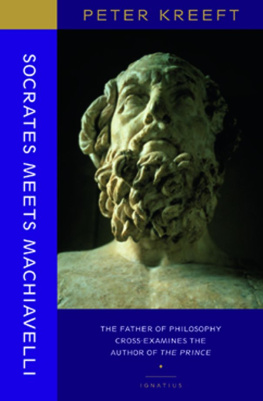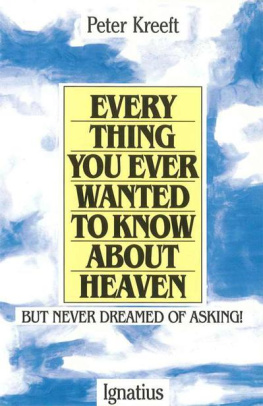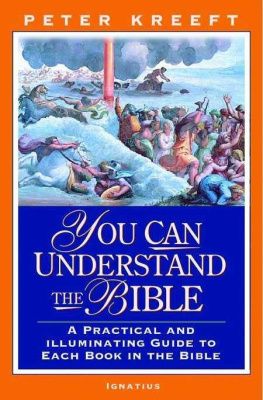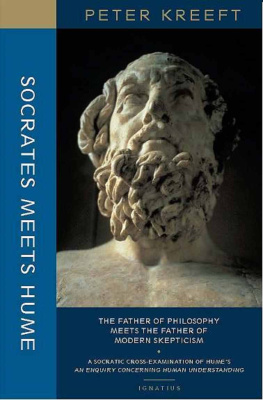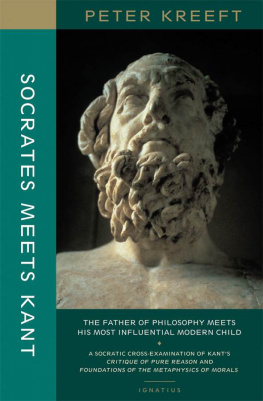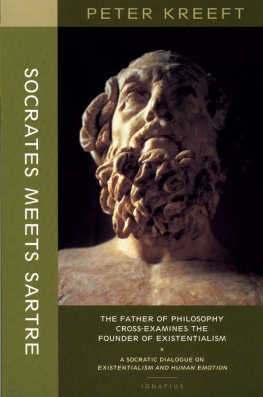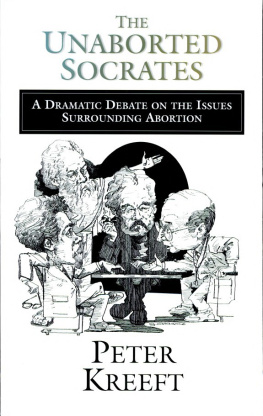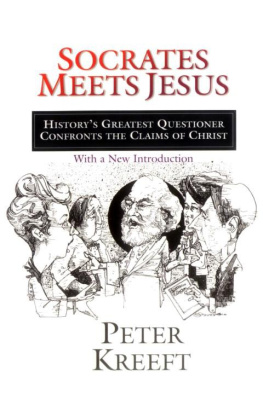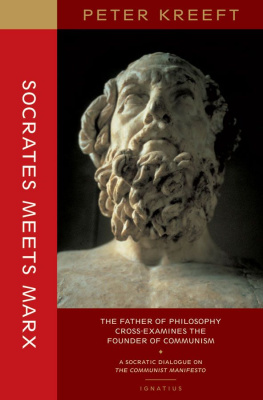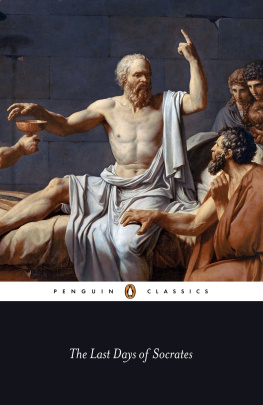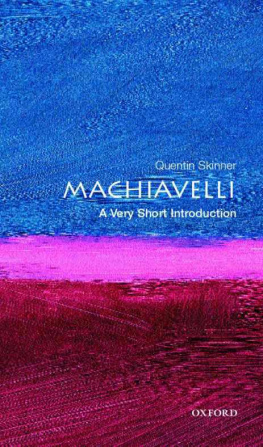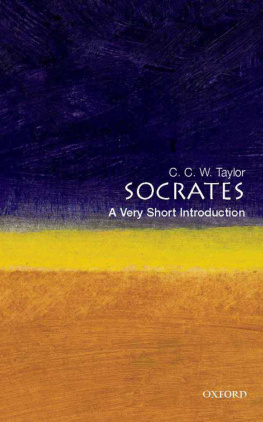Socrates Meets Machiavelli
Socrates Meets Machiavelli
______________
The Father of Philosophy
Cross-Examines the
Author of The Prince
by Peter Kreeft
IGNATIUS PRESS SAN FRANCISCO
The author expresses his appreciation for permission to reprint excerpts from
The Prince , translated with an introduction by George Bull (Harmondsworth, England, and New York; Penguin Books, 1975).
The Prince: with Selections from The Discourses , translated by Daniel Donno, edited and with an introduction by the translator (Toronto and New York: Bantam Classic, 1981).
Machiavelli, Selected Political Writings , translated by David Wootton (Indianapolis: Hackett Publishing, 1994.) Reprinted by permission, of Hackett Publishing Company, Inc. All rights reserved.
Cover art: Stone Head of an Ancient Greek (469-399 B.C.)
(classic sculpture)
The Louvre, Paris, France / Bridgeman Art Library
Cover design by Roxanne Mei Lum
2003 Ignatius Press, San Francisco
All rights reserved
ISBN 0-89870-926-1
Library of Congress Control Number 2001098030
Printed in the United States of America
Contents
Introduction
This book is one in a series of Socratic explorations of some of the Great Books. Books in this series are intended to be short, clear, and non-technical, thus fully understandable by beginners. They also introduce (or review) the basic questions in the fundamental divisions of philosophy (see the chapter titles): metaphysics, epistemology, anthropology, ethics, logic, and method. They are designed both for classroom use and for educational do-it-yourselfers.
The Socrates Meets... books can be read and understood completely on their own, but each is best appreciated after reading the little classic it engages in dialogue.
The settingSocrates and the author of the Great Book meeting in the afterlifeneed not deter readers who do not believe there is an afterlife. For although the two characters and their philosophies are historically real, their conversation, of course, is not and requires a willing suspension of disbelief. There is no reason the skeptic cannot extend this literary belief also to the setting.
The Characters
SOCRATES: Here! Here, Niccol, over here.
MACHIAVELLI: Whowhatwhere? Who are you, sir, that you dare to call me like a dog? Show yourself!
SOCRATES: I am right here, directly in front of you.
MACHIAVELLI: Well, I cant see you through all this damned fog. Where the Hell am I?
SOCRATES: Fear not, you are not in Hell.
MACHIAVELLI: I didnt mean it literally, you simpleton!
SOCRATES: Are you sure? Was that not your deepest fear?
MACHIAVELLI: I was not so dogmatic as to claim knowledge of the next world, like all those credulous Christians.
SOCRATES: And therefore you had no fear of what might await you? You did not claim to know that all those credulous Christians were right about there being an afterlife and a Hell; did you claim to know that they were wrong ?
MACHIAVELLI: I was a practical person. Correction: I am a practical person. (Why am I speaking of myself as if I were dead?)
SOCRATES: If you were a practical person, why did you not take measures against this feared and unknown future when you had the power to do so? Did this not contradict one of the most practical principles in your own book?
MACHIAVELLI: Youve read my book?
SOCRATES: I have.
MACHIAVELLI: And?
SOCRATES: I admire your practical wisdom in many places. For instancelets seeI know I remember the place
MACHIAVELLI: You have my book there! I can see you nowwhy is there still this fog?
SOCRATES: The fog is only in your mind, my friend, as you will soon see. Thats one of the peculiarities of this place. Ah, yes, heres the passage, I knew it was there in chapter 3, where you go on about the Romans, your heroes of practical wisdom: I quote
MACHIAVELLI: Wait! Who are you? And why do you have my book with you? And what is this place?
SOCRATES: All in good time, my friend, all in good time. I will not be distracted from this point, this wonderfully wise passage
MACHIAVELLI: You want to prove to me that I should have had the fear of Hellfrom my own words?
SOCRATES: Exactly.
MACHIAVELLI: Are you from the Inquisition?
SOCRATES: Oh, my, no! Nothing like that here . And yet, in a sense, you may say that I am a one-man inquisition. Inquiry, now, thats my thing. But none of those ridiculous threats of torture. No, no, I will not be distracted. Wheres that passage? Ive lost it again
MACHIAVELLI: The middle of chapter 3. In the paragraph beginning with The Romans.
SOCRATES: Thank you. Yes, there it is. You are wise to know exactly what I was going to read.
MACHIAVELLI: Then why waste time reading it?
SOCRATES: Oh, no time can be wasted here.
MACHIAVELLI: Here?
SOCRATES: For the last time, no more distractions! Here
MACHIAVELLI: I hate that word!
SOCRATES: Listen to this:
[Bull, p. 39, ll. 20-30.]
[T]he Romans did what all wise rulers must: cope not only with present troubles but also with ones likely to arise in future, and assiduously forestall them. When trouble is sensed well in advance it can easily be remedied; if you wait for it to show itself any medicine will be too late because the disease will have become incurable. As the doctors say of a wasting disease, to start with it is easy to cure but difficult to diagnose; after a time, unless it has been diagnosed and treated at the outset, it becomes easy to diagnose but difficult to cure. So it is in politics.
You knew this principle in regard to the body and the body politic; why did yon not know it in regard to your soul?
MACHIAVELLI: Now I can see you
SOCRATES: You must answer the question, you know, either sooner or later. Theres no more hiding here.
MACHIAVELLI: You said that here is not Hell.
SOCRATES: Correct.
MACHIAVELLI: I did die, didnt I?
SOCRATES: Correct again.
MACHIAVELLI: So is this Heaven or Purgatory?
SOCRATES: It is Purgatory for you and Heaven for me.
MACHIAVELLI: How can that be?
Socrates: It is for me a continuation of the most heavenly task I knew on earth: to inquire of the great sages, to pursue wisdom from those who know. For they are the opposite of myself, who do not know. And it will be Purgatory for you as it was to my fellow citizens on earth. But here no one has power to give the gadfly a swat and send him away to the next world. This is the next world. You must endure my questions.
MACHIAVELLI: So you are my torturer.
SOCRATES: No, I am your friend.
MACHIAVELLI: My inquisitor.
SOCRATES: No, your teacher.
MACHIAVELLI: By means of inquisition.
SOCRATES: No, by means of inquiry. The unexamined life is not worth living, you know.
MACHIAVELLI: Now I see clearly, you ugly old man. I know who you are.
SOCRATES: I thought that would be obvious.
MACHIAVELLI: Youre one of those Socrates impersonators. Ive seen a dozen of you at the university. Youre tediously unoriginal.
SOCRATES: I guess its not so obvious after all. No, Niccol, I am the genuine article, the original, I assure you.
MACHIAVELLI: So this is my Purgatory: to be cross-examined by Socrates.
SOCRATES: Im afraid so.
MACHIAVELLI: Do I have any alternatives? Any choice?
SOCRATES: No. We both have to fulfill our orders. They come from higher authority. You see, every philosopher has to endure my questions. You are not alone.
MACHIAVELLI: Plato, too? Did Plato have to face you?
SOCRATES: Indeed, he did.
MACHIAVELLI: How I would love to hear that exchange!
SOCRATES: It is not permitted. Not now, anyway. Perhaps later, much later. But now it would be a distraction. And that is exactly the opposite of what this place is for.
Next page
